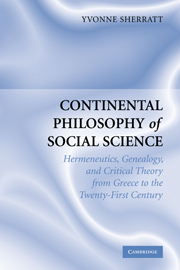Book contents
- Frontmatter
- Contents
- Preface
- Continental Philosophy of Social Science
- Introduction
- PART I THE TRADITION OF HERMENEUTICS
- PART II THE TRADITION OF GENEALOGY
- Introduction
- 6 The History of Genealogy: Nietzsche
- 7 Theory of Genealogy: Foucault
- 8 Applications of Genealogy
- PART III CRITICAL THEORY
- Conclusion
- Bibliography
- Index
8 - Applications of Genealogy
Published online by Cambridge University Press: 23 November 2009
- Frontmatter
- Contents
- Preface
- Continental Philosophy of Social Science
- Introduction
- PART I THE TRADITION OF HERMENEUTICS
- PART II THE TRADITION OF GENEALOGY
- Introduction
- 6 The History of Genealogy: Nietzsche
- 7 Theory of Genealogy: Foucault
- 8 Applications of Genealogy
- PART III CRITICAL THEORY
- Conclusion
- Bibliography
- Index
Summary
We have studied Foucault's philosophical perspectives on the human sciences. His approach centres around concepts of Power/Knowledge and the theory of genealogy. Our final purpose is to look at how he deploys these philosophical approaches to practical, dare I say, ‘empirical’ instances in the human sciences. Here we can do no better than continue with Foucault's own work and examples of genealogy. First, we conduct a detailed study of his genealogy of the penal system. Secondly, we examine his work on the history of sexuality.
PENAL INSTITUTIONS
For our example of the application of Foucault's approach of genealogy we look first to the particular institutions and practices of criminal reform. Foucault studies these in his seminal Discipline and Punish. Foucault analyses our modern disciplinary regime by doing a genealogy. He looks to the heterogeneous past of the penal regime – its transitions through the historical power struggles by which it is constituted. There are three main stages of historical change and rupture that result in the constitution of the contemporary penal system, according to Foucault. These are firstly, torture, secondly, punishment and finally, modern discipline.
TORTURE
Let us look first at the practice of torture. Foucault begins his genealogy of the penal system in true characteristic style, with a flamboyant attempt to shock. It is not for the faint-hearted.
- Type
- Chapter
- Information
- Continental Philosophy of Social Science , pp. 165 - 174Publisher: Cambridge University PressPrint publication year: 2005

